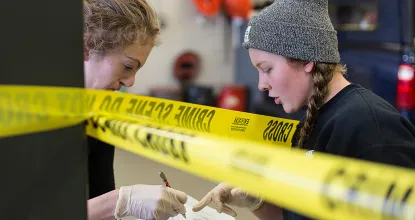As the Coordinator of the Criminal Justice Department and on behalf of our faculty and staff, I would like to take this opportunity to welcome you to the Criminal Justice Department.
Criminal justice is one of the most popular majors at NMU. Our faculty have diverse professional backgrounds providing a wealth of knowledge in the criminal justice, corrections, or loss prevention fields. Our programs synthesize the theoretical with applied knowledge in the field providing students with diverse perspectives leading to careers in law enforcement, corrections, loss prevention, and the court systems. We offer on-campus and online courses as well.
We are part of the College of Health Sciences and Professional Studies (CHSPS). Click to view the other departments in our college.
We offer a wide range of undergraduate degree programs including two associates, and two bachelor's degrees (both can be completed online), and three minors in Criminal Justice, Loss Prevention, and Wildlife Conservation Law and Policing.
There are hundreds of jobs to choose from in the field of criminal justice. Many of these jobs are currently in high demand, and labor specialists predict that federal jobs in criminal justice will continue to grow. Please explore our website to learn more about the criminal justice field. If you have any questions, please contact our office at 906-227-2660.
Robert A. Hanson
Department Head
Criminal Justice & Loss Prevention
History of the Criminal Justice Department
When crime rates began to increase in the 1960s and 1970s, the federal government responded by increasing education and licensure of law enforcement personnel. The Law Enforcement Assistance Administration (LEAA) provided funding for enhancement officer training and education. In the early 1970s, Arthur Neiger, director of the Bureau of School and Community College Services, received an LEAA grant to conduct a two-week training academy for working police officers. Eventually, the Northern faculty took the training program across the region as a 16-week Regional Training Academy.
In 1962, Neiger developed an associate degree program in law enforcement, as well as a two-year police science curriculum. When administrators in corrections, security and conservation caught on to the trend, a curriculum was created in these aspects of criminal justice, and two and four-year degrees were offered in law enforcement or corrections/private security. The Michigan Board of Education approved the four-year criminal justice program in the fall of 1974.
By the spring of 1977, Criminal Justice was named a department in the then School of Arts and Sciences. Later it was attached to the College of Behavioral Sciences, Human Services, and Education. In 1992, the department was renamed Justice Studies, only to return to its original name in 1995.
Today, NMU continues to offer each summer the Regional Training Academy and throughout the year the Police Institute Training, for current police officers and police administrators.
In fall 2007, Northern began to offer a Bachelor in Loss Prevention Management degree, a completely online program. It is the first loss prevention bachelor’s degree in the United States and was developed, in part, by an advisory board made up of some of the largest retailers in the nation. In 2016, the department created a new minor in Wildlife Conservation Law and Policing for aspiring conservation officers. This minor is one of the first in the nation.
Department chairs or heads: Ken Fauth, 1977-1981; Robert Barrington, 1981-1987; Donald Lee, (acting) 1987-1989, 1989-1991; David Kalinich, 1992-1997; Paul Lang, 1997- 2006, Greg Warchol, (acting) 2006-2007, Dale Kapla, 2007-2012; Charles Mesloh, 2013-2015; Michael Harrington, 2015-2017; Bob Hanson, 2017-present.
Source: A Sense of Time: The Encyclopedia of Northern Michigan University
Mission of the Criminal Justice Department
The Criminal Justice Department is committed to a curriculum that incorporates salient domestic and international issues to equip students with the theoretical, practical and technical knowledge necessary for a successful career in law enforcement, criminal courts or corrections, within a curriculum which emphasizes cultural diversity and individual differences.
